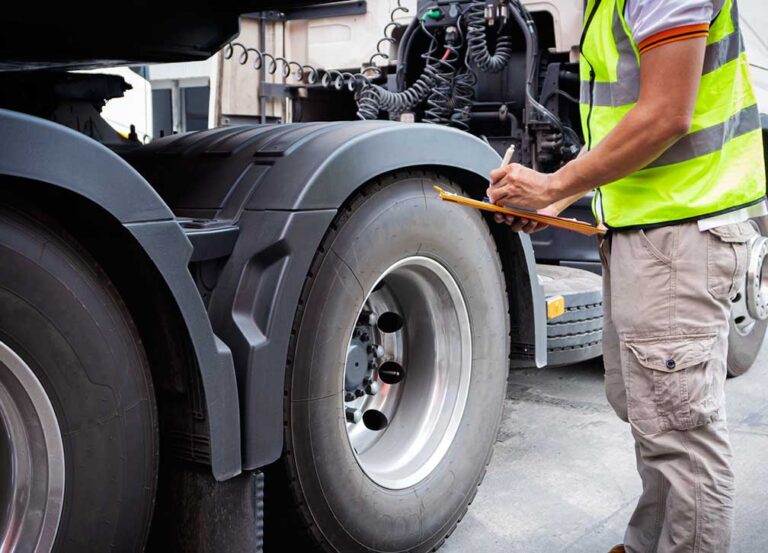Let’s face it: No driver enjoys being stopped and going through a Department of Transportation (DOT) inspection. However, those inspections help ensure that truck owners and drivers stay on top of equipment maintenance and repair that could very well save lives. In addition to the mechanical aspects of an inspection, drivers must be prepared to present required documents and records, such as their commercial driver’s license (CDL), ELDs, medical evaluation certificates and more.
While some in the industry may question the reasoning behind inspection blitzes like the Commercial Vehicle Training Alliance’s (CVSA) yearly International Roadcheck — which is scheduled for May 14-16 this year — the results of the inspections would appear to justify the need for the event.
During the 2023 Roadcheck, a total of 59,429 vehicles were inspected. Of those, 19% were placed out of service (OOS) because of a critical defect. That means that, on average, nearly 1 out of every 5 commercial motor vehicles (CMVs) was taken off the road because of safety violations. On top of that, 3,256 drivers were placed OOS for having at least one qualifying violation.
Be aware of Roadcheck dates, focus areas
It’s important to note that the International Roadcheck is never a surprise for drivers or fleet operators; the CVSA publicizes the dates well ahead of time, and the focus areas of the event are released at least a month before the inspection dates.
Trucking publications across North America, including The Trucker, work to get the word out to those in the industry.
While the International Roadcheck is a useful tool to help keep drivers safe on the road, keep in mind that the violation stats released following the event don’t accurately reflect the trucking industry as a whole. That’s because different jurisdictions use different methods of selecting which trucks and drivers to inspect. Some look for older equipment that’s messy or appears not to be well cared for. Some target certain types of trucking, such as log or waste haulers. In addition, the numbers include buses and straight trucks in addition with Class 8 tractors and trailers.
The selection process isn’t purely random, but the numbers are often reported as if they represent all of trucking.
Be prepared
If you’ll be on the road during this year’s Roadcheck, there’s a chance you’ll be one of the “lucky” drivers who gets selected for some personal attention. It’s a good idea to be prepared.
As far as your vehicle goes, if you’re performing proper pre- and post-trip inspections, there should be few surprises. If you can hear air leaking from a line, the inspector will hear it, too. Oil and other fluid leaks will be seen. Tire tread will be measured, and that rust streaming from lug nuts will get a closer look. Anything that’s obvious to your eye will most likely be found by an inspector.
If you haven’t routinely checked springs and air bags, along with their mounting components or steering linkage, it’s a good idea to give them a look before Roadcheck. Obviously, lights, belts, hoses and other items that can show wear need checking. Tires should be thoroughly inspected for tread depth and sidewall damage, and any dual tires that are mismatched changed out.
Brakes that aren’t adjusted properly are a popular item on the inspection tour. If a slack adjuster is out of adjustment, you can actually receive two violations — one for a brake out of adjustment and another for having an automatic adjuster that isn’t working properly. If your truck is due for service or needs to go into the shop for any reason, it’s a good idea to have brake adjustment checked. The inspector will also check brake shoe or pad depth and the condition of drums or discs.
What to expect
While there are eight levels of inspection, most inspections during International Roadcheck will be of the Level I variety — the full inspection of both vehicle and driver.
Both Level I and Level III inspections include a check of the driver’s credentials. While it sounds simple — just make sure your CDL is up to date and close at hand — there are other considerations. In many states, a driver’s CDL can be suspended for failure to pay child support or other court-ordered fees. CDLs can be downgraded by states if current medical information isn’t on file. Hazardous materials endorsements may be rescinded if TWIC cards expire, or if renewal testing isn’t completed.
Often, states mail notices of these actions to the driver’s address on record, and it’s possible the driver isn’t aware the CDL is no longer valid. If there’s any reason to suspect your license may be impacted, go ahead and check. Most states let drivers request a motor vehicle report (MVR). It may cost a few dollars, but it’s a good way to make sure your CDL is good to go — before you hand it to an inspector.
Each driver’s Medical Examiner’s Certificate should be on file with the state that issued the CDL. However, it never hurts to have a copy in the truck, just in case. The Skill Performance Evaluation Certificate is another document drivers frequently don’t have in their possession.
Of course, your record-of-duty status needs to be up to date, along with any vehicle inspection reports you’ve used to write up deficiencies. Permit books may be inspected, too. Registration and IFTA (International Fuel Tax Agreement) documents, plus permits for any specific states must be up to date.
Finally … don’t forget your seat belt. Just making sure you have it on when you speak to an inspector may not be enough. Weigh stations and inspection facilities have cameras that catch a lot of details. In fact, not wearing your seat belt could be the reason you are selected for inspection.
2024 focus areas
This year’s Roadcheck is scheduled for May 14-16, and the focus areas are drug and alcohol possession and use and tractor and trailer protection valves.
For the drug and alcohol part, you’ll be observed for signs of being under the influence, and your truck and trailer may be checked. A query will be conducted with the Drug and Alcohol Clearinghouse. If you have not registered with the Clearinghouse, it’s a good idea to get that done now. If you’ve failed a drug or alcohol test in the past four years, it’s likely that the record of the test and your return-to-duty (RTD) program will be in the files. If you tested positive and did not go through the RTD process, that will show up, too.
During the vehicle inspection, you may be asked to disconnect the gladhands from the trailer, allowing air to escape until the tractor and trailer protection valves pop out. Air lines from the tractor and gladhand seals will be given particular attention. Carry extra seals, just in case.
If everything goes well, you’ll win a new CVSA inspection decal, as more than 14,000 vehicles and drivers did in last year’s inspection.
Cliff Abbott is an experienced commercial vehicle driver and owner-operator who still holds a CDL in his home state of Alabama. In nearly 40 years in trucking, he’s been an instructor and trainer and has managed safety and recruiting operations for several carriers. Having never lost his love of the road, Cliff has written a book and hundreds of songs and has been writing for The Trucker for more than a decade.








